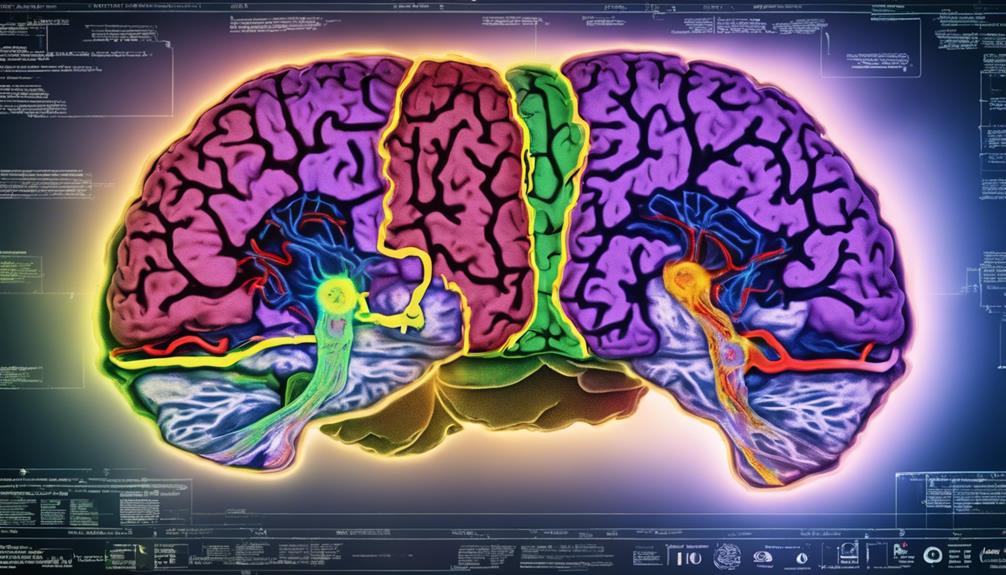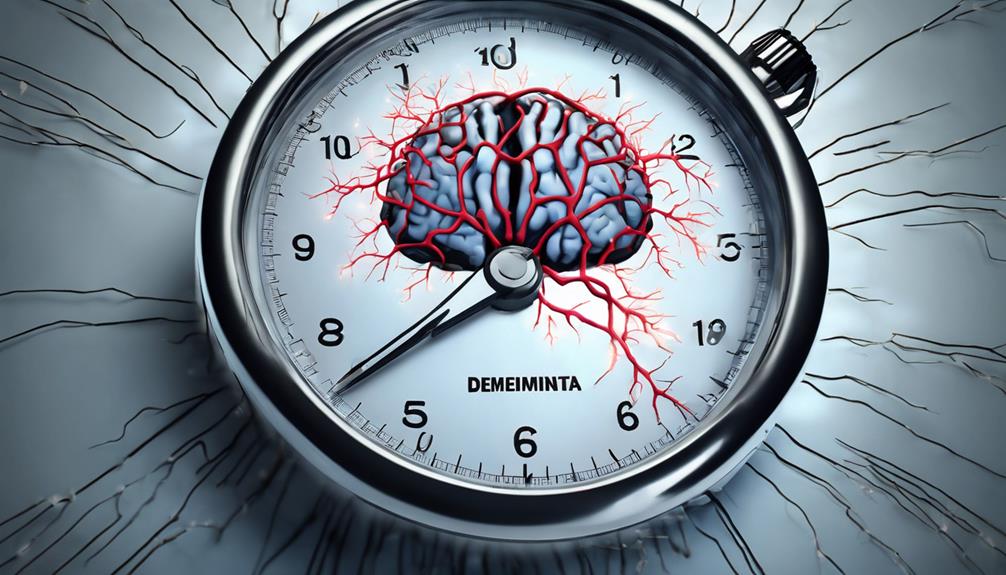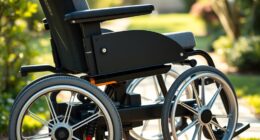The intricacies of dementia highlight the clear existence of seizures in this situation. Picture a scenario where an individual with dementia suddenly has an inexplicable seizure.
The correlation between dementia and seizures raises intriguing questions about the underlying mechanisms and implications for care.
Let's explore how these seizures manifest, their potential impact on individuals with dementia, and the strategies employed to address this intricate intersection of conditions.
Key Takeaways
- Dementia patients are prone to recurrent seizures.
- Changes in brain structure contribute to dementia-related seizures.
- Comprehensive care involves tailored treatment and lifestyle adjustments.
- Caregiver support and education are vital for managing dementia seizures.
Understanding Dementia Seizures
When exploring the realm of dementia seizures, it's imperative to understand the distinct characteristics and implications of these neurological events within the context of cognitive decline. Seizures in dementia, especially in Alzheimer's patients, carry a heightened risk of both generalized tonic-clonic and focal seizures. The presence of seizures in dementia can't only accelerate cognitive decline but also exacerbate behavioral symptoms, underscoring the importance of proper diagnosis and management.
Alzheimer's patients are particularly susceptible to recurrent seizures compared to individuals without dementia. Changes in brain structure, such as the accumulation of proteins like amyloid and tau, play a significant role in the development of seizures in dementia. Understanding these structural alterations is crucial for identifying potential triggers and implementing targeted interventions to mitigate the impact of seizures on cognitive function.
Recognizing the intricate interplay between seizures, dementia, and alterations in brain structure is paramount for providing comprehensive care to individuals experiencing these neurological challenges. By delving into the scientific nuances of these phenomena, healthcare professionals can enhance their ability to serve this vulnerable population effectively.
Causes of Dementia Seizures

Neuron loss and abnormal electrical activity in the brain associated with dementia can precipitate the occurrence of seizures. In Alzheimer's disease, changes in brain structure like hippocampal sclerosis may contribute to seizure development.
Dysregulation of neurotransmitters, such as glutamate and gamma-aminobutyric acid (GABA), could also play a role in causing seizures in dementia. Additionally, factors like neuroinflammation and neurofibrillary tangles are being investigated as potential links between dementia and seizures.
The intricate relationship between Alzheimer's disease and the onset of seizures is still under research, highlighting the complexity of this phenomenon. Understanding how these elements interact within the brain structure is crucial for comprehending the mechanisms behind seizures in dementia.
Managing Seizures in Dementia
To effectively manage seizures in dementia, a comprehensive approach combining diagnostic tests, medication, lifestyle adjustments, and ongoing monitoring is crucial. When addressing seizures in dementia, caregivers and healthcare providers must collaborate to ensure the best care for patients. Here are key steps in managing seizures in dementia:
- Accurate Diagnosis: Utilize EEG and MRI tests to pinpoint the type and origin of seizures for tailored treatment.
- Medication Management: Administer anti-seizure medications such as Keppra or Depakote under medical supervision to control seizures effectively.
- Lifestyle Modifications: Implement stress reduction techniques and lifestyle adjustments to complement medication and reduce seizure frequency.
Treatment Options for Dementia Seizures

Treatment options for dementia seizures encompass a multidimensional approach that integrates medication management, lifestyle modifications, and regular monitoring to effectively control seizure activity in individuals with dementia. Antiseizure medications like Keppra or Depakote are commonly prescribed to manage seizures in dementia patients. Adjusting medication dosages and monitoring for potential side effects are crucial aspects of treatment.
Lifestyle modifications, including stress reduction techniques, can complement medication in effectively managing seizures in individuals with dementia. It's essential to have regular monitoring and follow-up with healthcare providers to ensure the treatment plan for dementia seizures remains optimal. Seeking guidance from dementia specialists and support groups can provide valuable insights and support in the management of seizures in dementia.
Caregiver Support for Seizures
Caregiver support plays a crucial role in effectively managing seizures in dementia patients, providing valuable insights and coping strategies for handling behavioral changes and daily care routines.
Caregivers of dementia patients experiencing seizures should consider the following:
- Joining caregiver support groups can offer emotional support, practical advice, and a sense of community to navigate the challenges associated with caring for someone with dementia and seizures.
- Learning seizure first aid techniques equips caregivers with the knowledge to respond promptly and appropriately during a seizure, ensuring the safety and well-being of the individual.
- Understanding the impact of seizures on dementia patients helps caregivers tailor their approach, anticipate potential triggers, and provide personalized care that promotes comfort and stability.
Frequently Asked Questions
What Stage of Dementia Is Seizures?
Seizures can occur at any stage of dementia, but they're more common in the later stages. The risk increases as dementia progresses. People with dementia, especially Alzheimer's disease, are at a higher risk as the condition advances.
Seizures may be more frequent and severe in advanced dementia. Early recognition and management are crucial for optimal care. Prioritizing seizure management in all stages of dementia is key for maintaining quality of life.
What Causes Seizure in Dementia Patients?
When neurons misfire due to abnormal electrical signaling or structural brain changes, seizures can occur in dementia patients. Proteins like amyloid and tau, common in dementia, can also trigger seizures.
Factors such as the progression and duration of dementia, low birth weight, and premature birth can increase seizure risks. Recurrent seizures may further harm cognitive function and worsen behavioral symptoms over time.
What Are 3 Things to Never Do With Your Loved One With Dementia?
When caring for a loved one with dementia, it's crucial to avoid arguments, correct behaviors, and ignore their emotions. Instead, prioritize their safety, well-being, and emotional needs.
Never leave them in unsafe situations, rush them, or overstimulate them. Always approach interactions with patience, understanding, and compassion.
When Is It Time to Put a Dementia Patient in a Home?
When it's time to consider residential care for a dementia patient hinges on factors like safety, caregiver stress, and the person's ability to manage daily tasks.
As their needs surpass what can be managed at home, signs like wandering, aggression, incontinence, or falls may indicate the need for specialized care.
Financial resources, support systems, and available care services all play roles in deciding when transitioning to a care facility is best.
Conclusion
In conclusion, navigating dementia seizures can be a challenging journey for both patients and caregivers. With proper diagnosis, management, and support, individuals with dementia can effectively cope with the impact of seizures.
It's important to remember that 'knowledge is power' when it comes to understanding and addressing the complexities of seizures in dementia. By staying informed and proactive, we can strive to improve the quality of life for those affected by this condition.









